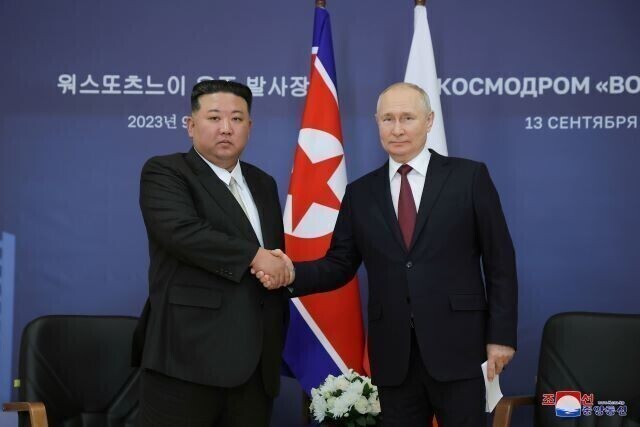hankyoreh
Links to other country sites 다른 나라 사이트 링크
[Guest essay] Seoul is missing the ‘golden hour’ for diplomacy with its northern neighbors


By Park Chong-soo, former chairman of the Presidential Committee on Northern Economic Cooperation
South Korea has disregarded “nordpolitik” toward North Korea, China and Russia for the past three years in favor of “values diplomacy” with the US and Japan.
National security adviser Chang Ho-jin recently expressed optimism about Seoul-Moscow relations being effectively managed through the “balance of concern” and about the prospect of those relations “being restored following the war in Ukraine.” That assumes, of course, the lack of external factors such as the formation of geopolitical blocs. Unfortunately, history doesn’t look kindly on hopeful assumptions.
First, we should look at the geopolitical situation, which Chang downplays as an external factor. Blocs are already being formed. Jeffrey Sachs, a professor at Columbia University, has argued that the age of singular American hegemony is over. He’s speaking about a multipolar world sometimes called “G-Zero.” This is a fundamental shift in international relations brought by the war in Ukraine.
There’s also the rise of BRICS, a group of emerging economies that notably include Brazil, Russia, India, China and South Africa. The group admitted six new members in a summit in South Africa last year. It’s likely to flex its muscles even more during the summit scheduled to be hosted in Kazan, Russia, in October. The nations of the Global South (referring to developing countries around the equator and in the Southern Hemisphere) are aligning under the leadership of Russia and China.
Another assumption is that South Korea’s relations with Russia will be restored after the war in Ukraine. It’s widely known that the Zelenskyy government couldn’t hold out more than a couple months without Western aid. After that aid was suspended because of the Israel-Hamas war, the tide of war shifted in favor of the Russian military.
In that crisis situation, the US Congress passed a US$68 billion aid package for Ukraine, along with authorizing the seizure of Russian state assets overseas. That allows Ukraine to rebuild its military, but there’s little chance it will reclaim the four northeastern oblasts, or provinces, seized by the Russians. One way or another, the war is sure to carry on for some time.
For Russia at war, its biggest ally is North Korea. Let’s not fool ourselves: Russia won’t hold back in its cooperation with the North. According to figures released by the National Intelligence Service last year, Russia imported a million 152 mm shells from North Korea. Presuming that each shell is worth US$600, that’s worth about US$600 million. When North Korea’s missile and drone sales are included, the bill runs into the billions of dollars. Pyongyang can then turn around and use those funds to develop nuclear weapons and missiles.
That’s hardly the only form of potential cooperation. There’s talk about North Korea sending 200,000 people, both as workers for the postwar reconstruction and as mercenaries for the field of battle. In the case of mercenaries, North Korea is able to earn US$30,000 per person, as well as giving its soldiers actual war experience. That’s similar to what South Korea got out of its troop commitment in the Vietnam War.
That also enables Russia to minimize the sacrifice of its own citizens and let North Korean troops serve as cannon fodder instead. The four northeastern oblasts that Russia has annexed can also be mutually beneficial economic partners for North Korea, which can export magnesite and import cereals, machine parts and coke.
There are many intangible benefits that North Korea can gain from Russia as well, including the obstruction of sanctions against the North. In 2022, Russia and China teamed up to block a UN Security Council sanctions resolution against North Korea for the first time. Then in March, Russia vetoed the extension of a mandate for an expert panel under the UN Security Council Sanctions Committee on North Korea.
South Korea was helpless to act, despite being a nonpermanent member of the UN Security Council. US Defense Secretary Lloyd Austin stressed during a House hearing at the end of April that North Korean cooperation with Russia was a very concerning matter that should be handled as a top priority.
Until just two years ago, Russia’s policy had been to remain equidistant from South and North Korea. But now that balance has been broken. Russia’s chummy ties with North Korea are entirely a reaction to its hostile relations with South Korea, which are at the worst point since the two countries normalized diplomatic relations.
South Korean automobiles and home appliances had ranked first or second in the Russian market shortly before the war, but have now slipped to sixth or seventh. Hyundai sold off its factories and withdrew from the country.
Now, even South Koreans living in Russia are full of anxiety. In January, a South Korean missionary surnamed Baek was arrested on charges of espionage and detained in a notorious prison operated by Russia’s Federal Security Service. The head of the Russian operations of a medium-sized South Korean company doing business in Primorsky Krai was also arrested and deported.
The leader of the Saint Petersburg branch of the Peaceful Unification Advisory Council (former head of the local Korean association) was banned from entering the country. He wasn’t allowed to take any assets, or even a single change of clothing. An individual surnamed Shim in the food and beverage industry is in danger of losing his property, too. How many South Koreans will hang on until the war is over?
At the end of last year, the Russian government promised to take “asymmetric retribution.” But a spokesperson with South Korea’s Ministry of Foreign Affairs has downplayed the losses suffered by Korean citizens as being “unconnected to Seoul-Moscow relations.”
South Korea had several opportunities to negotiate with the Russians while Baek, the missionary, was being arrested in Vladivostok, transferred to Moscow and covered in the state-run press. But the very government that’s supposed to be protecting the safety and property of citizens overseas was nowhere to be seen.
Thus, Korea missed the “golden hour” for negotiations. Mike Pompeo, who served first as CIA director and then as US Secretary of State, used a visit to Pyongyang for Donald Trump’s summit with Kim Jong-un in 2018 as an opportunity to secure the release of three American missionaries who had been detained in the North. Why is the South Korean government staying silent? What was even the point of setting up the Overseas Koreans Agency?
The “golden hour” is of great importance not only in emergency medicine but also in diplomatic negotiations. The Korean government needs to stop complacently assuming that relations with Moscow will be automatically restored over time and become more proactive about managing relations with our powerful northern neighbor.
Please direct questions or comments to [english@hani.co.kr]

Editorial・opinion
![[Editorial] Seoul must use tact and diplomacy to check deepening Russia-NK ties [Editorial] Seoul must use tact and diplomacy to check deepening Russia-NK ties](https://flexible.img.hani.co.kr/flexible/normal/500/300/imgdb/original/2024/0614/8417183518068633.jpg) [Editorial] Seoul must use tact and diplomacy to check deepening Russia-NK ties
[Editorial] Seoul must use tact and diplomacy to check deepening Russia-NK ties![[Editorial] Thorough audit, evaluation of oil test drilling are needed [Editorial] Thorough audit, evaluation of oil test drilling are needed](https://flexible.img.hani.co.kr/flexible/normal/500/300/imgdb/original/2024/0610/2017180109432618.jpg) [Editorial] Thorough audit, evaluation of oil test drilling are needed
[Editorial] Thorough audit, evaluation of oil test drilling are needed- [Editorial] Yoon prioritizes his administration over South Korea’s safety once again
- [Column] The monumental shift in N. Korea’s nuclear program that never happened
- [Editorial] Yoon must submit himself to questioning over Marine investigation interference
- [Editorial] Court’s reversal of prosecutor’s impeachment will only embolden his peers
- [Column] How Korea’s restaurant servers went from being called ‘aunties’ to ‘bosses’
- [Column] Samsung’s screwup, Lee Jae-yong’s crisis
- [Column] The growing price of maintaining the president’s ego
- [Column] Taiwan’s new president bucked China’s silent demands for neutrality — now what?
Most viewed articles
- 122 years later, Korean girls killed by US troops remain a symbol of the price of military tensions
- 2Propaganda leaflets are ‘paper bombs’ — should S. Korea be letting private actors drop them?
- 3As Putin visits Pyongyang, Seoul to host Chinese diplomatic, security officials for dialogue
- 4S. Korea flouts UN body’s call for reparations for sex-trafficked Filipinas
- 5[Column] Samsung’s screwup, Lee Jae-yong’s crisis
- 6[Photo] Amid rising tensions, life goes on across the DMZ
- 7Korea slated to chair ILO executive body, but has long way to go on its own labor policies
- 850 years later, US military still a fixture in Gyeonggi ‘camp towns’
- 9Japanese media’s “one-sided” reporting on comfort women issue
- 10First-ever protest encircles the US embassy in Seoul